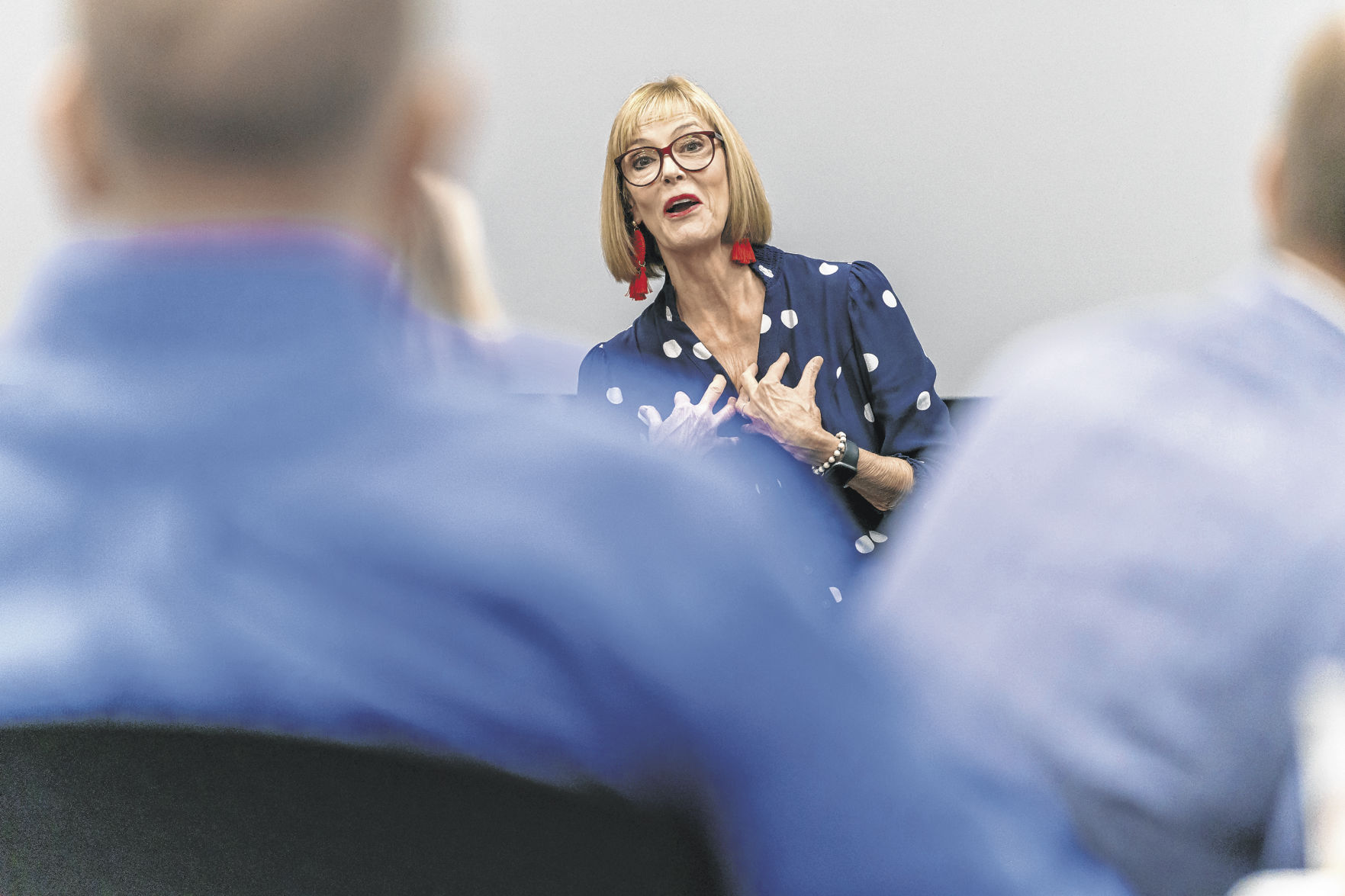By Noah Crenshaw | Daily Journal
[email protected]
Lt. Gov. Suzanne Crouch discussed state initiatives and the coronavirus pandemic during a rotary club luncheon on Monday in Greenwood.
The Greenwood Rotary Club hosted Crouch at Central Nine Career Center. Crouch was scheduled to discuss issues of interest to area businesses and the region, and have a Q&A with local business, government and organization leaders in attendance.
Minutes into the luncheon, the conversation turned to COVID-19.
Crouch was asked by Steve Powell, former Greenwood Rotary Club President and Q&A moderator, about the state’s response to the pandemic. Since it began, more than 830,000 people have tested positive, and more than 13,000 people have died, according to the Indiana Department of Health.
Data leads the state’s response. Deaths and hospitalizations, while up, are nowhere near where they were. About 30% of intensive care unit beds are available statewide, Crouch said.
Based on that same data, the state has no plans to reimplement a mask mandate, she said.
The virus is expected to spike for about four weeks then level off and decline, Crouch said.
“What we are focused on is getting Hoosiers who are not vaccinated, vaccinated,” she said.
Despite the pandemic, the state was able to create more than 31,000 new jobs. Indiana’s economy is strong, despite workforce shortages and supply chain issues, Crouch said.
Indiana’s budget was also discussed. The state passed a $37 billion two-year budget, and when it came time to finalize it, legislators discovered they had $5 billion extra. The funding went toward paying cash for capital improvement projects and paying off debts, she said.
The budget also included funding for state initiatives, including broadband expansion, which received $250 million extra for projects, Crouch said.
If Indiana could connect Hoosiers to the internet, it could add billions of dollars to the state’s economy, she said.
The pandemic was a factor in deciding how to spend the additional funding. Virtual learning, remote work and telehealth rely on being connected, Crouch said.
“What we’ve discovered during COVID was being connected isn’t a luxury. It’s essential,” she said.
During the Q&A portion of the event, Crouch was asked about how the state will use funding from the U.S. Senate’s $1 trillion infrastructure bill, which includes funding for internet access. Indiana is not yet mapping out how to use the funds because the amount could change as the bill makes it way through the House of Representatives.
John Sturm, president of JCFiber, a local internet provider, asked Crouch how Indiana could get funding out faster to assist with broadband expansion efforts. The state is trying to get the money out as quickly as possible. The state recently announced a third round of its Next Level Broadband grants, and is expecting its subsidy programs to kick in and take applications by mid-September, she said.
Rural areas are in need now, Sturm said.
“Focusing in those really needy areas is important to understand,” he said.
About $500 million was also put into Indiana’s READI, or Regional Economic and Acceleration Development Initiative, grants. The goal of the grants is to attract talent and young people to Indiana, Crouch said.
Almost every county in the state, including Johnson County, have applied for the grants, which could attract more than $500 million in private and local investments statewide, she said.
The Indiana General Assembly also invested $100 million in mental health initiatives, something Crouch is most proud of, she said.
Many child care workers and educators have seen an increase in the number of children with mental health issues. Before the pandemic, 1-out-of-5 Hoosiers were dealing with mental illness or addiction, and now that number has increased, Crouch said.
“The human cost of this pandemic is huge, and we are going to see it exponentially grow for years to come,” she said.
The state also launched a NextLevel Veterans initiative, which Crouch was a key proponent of. The program brings together public and private organizations to recruit, employ and connect discharging military personnel to Indiana, and retain veterans who are already in the state.
Six months to a year before servicemembers leave the military, they begin to work on transitioning out of the military. The state goes onto military bases to recruit people for the initiative, Crouch said.
Indiana received a $50,000 grant from Duke Energy to hire part-time recruiters. Since the initiative began, more than 400 people have relocated to the state as a result, she said.
Indiana is also looking at ways to help those with developmental disabilities. The state has a task force set up to address their needs, Crouch said.
“Our friends with disabilities are just friends with different abilities,” she said. “They have the same dreams, hopes and desires as each and every one of us.”





